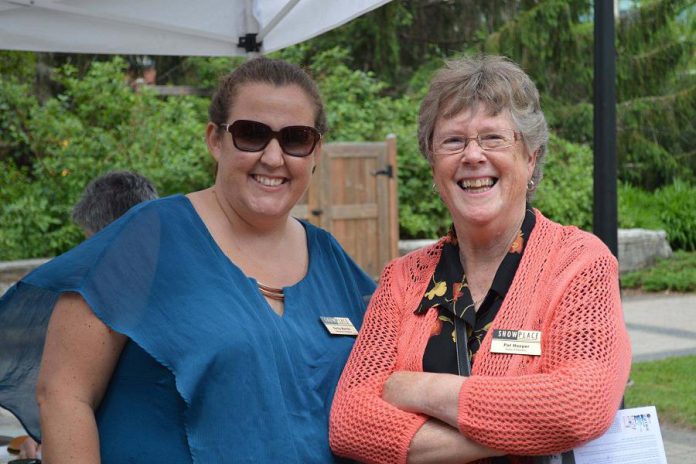
You’d be hard pressed to find a Peterborough resident who has never been to a show at either Showplace Performance Centre or Market Hall Performing Arts Centre, the two iconic performance venues in downtown Peterborough.
But you could find more than a few who don’t realize that both venues are operated by separate not-for-profit charitable organizations sharing a common mission to promote a diversity of arts and music in Peterborough.
It would be easy for Emily Martin (interim general manager of Showplace) and Chad Hogan (general manager of Market Hall) to do their own thing without regard for what the other is doing. After all, each is responsible for the success of their respective live performance venues and each answers for any shortcomings. And each is overseen by a board of directors tasked to ensure the financial viability of the organizations is maintained and built upon.
But a funny thing happened on the way to operating in a silo: Martin and Hogan saw the opportunity to take their existing personal friendship to the next level to the benefit of both venues. Yes, the focus of both is to keep the lights on at their venues, as it should be, but not at the expense of turning their backs on any opportunities to work together to the benefit of both.
“We respect each other and the work that we’re doing,” says Martin, who was appointed as Showplace’s interim general manager in the aftermath of Ray Marshall’s recent departure from that role after several years.
“We were out for lunch just last week and were sharing ideas. We share information and ideas back and forth all the time. There are a lot of other organizations where I’m sure your boss would think you’re going out to lunch with the competition and you would be in trouble. Our board actively encourages this.”

For his part, Hogan — who is “thrilled” that his friend has been elevated to the general manager role from her former post as marketing and administrative manager — is “excited to keep building our relationship. There are so many opportunities that are untapped and haven’t been explored.”
Both Hogan and Martin point to last November’s hosting of the Ontario Contact conference which saw them work with Ontario Presents, a province-wide network of performing arts touring and presenting organizations that work collaboratively to facilitate the distribution of live performing arts shows into communities across Ontario.
“We basically shut down both facilities for a week to host the event,” Hogan says. “That wouldn’t have happened if there was any sort of strained relationship or feelings of ill will towards each other.”
“That was a huge opportunity to showcase how we work together,” Martin agrees, and goes on to explain how the two venues complement one another.
“In the Nexicom Studio we have 100 seats, and we have 647 seats upstairs. Market Hall has something like 300 seats. It’s the perfect in-between. You can’t overfill the studio and, if you don’t have at least 300 people upstairs here, it looks a little empty. So someone might prefer to do a 300-seat event at Market Hall.
“Showplace has a product we can offer and vice versa. New Stages is a perfect example: they outgrew the studio, which is amazing for them, so they’re at Market Hall now. There’s more respect when you’re honest with people. They will remember you when they get bigger and want to come to Showplace and do something else.”
Anchoring the pair’s we-are-in-this-together approach is a shared vision of their venues’ purpose.

“Both of us are operating to serve a need in the community,” Hogan says. “The mandate is different from a private sector music venue. Our goal at the end of the day is not to make as much money as possible. That’s not say you’re fiscally irresponsible and don’t care about it. But certain types of art need to be presented or accommodated in a space.
“You could quite quickly pick out the one genre of music that is the most profitable and only do that if that was the goal. But it’s not. The goal is to have diverse arts offerings because the arts enhance the lives of citizens.
“A lot of events and shows work better in once facility or the other. It’s fairly obvious as to which facility makes sense. As much as we want to do a $35,000 show, we can’t do that here. Even from a presenting standpoint, if an agent calls one of us, we tend to direct them to the appropriate facility.
“There has never been, in my time here, a situation where there’s arm wrestling over where something is going to take place. In fact, we cross promote each other.”
“There’s this weird perception out there of this competition between our venues,” Martin adds. “But it’s not like a car dealership — you’re not competing for sales. We both have the same values and the same kind of mission to advance the performing arts. So why not help each other?”

Showplace board chair Pat Hooper notes Martin working with Hogan is but one example of Showplace’s nurturing of community partnerships. She points to ongoing relationships with Peterborough Musicfest, the Peterborough Downtown Business Improvement Area, and the Peterborough Symphony Orchestra as other examples.
“It’s working with whatever the audience is going to be in terms of size,” she says. “Not keeping things clutched to your chest but sharing and saying ‘This doesn’t work for us but perhaps it will work for you.’ We also don’t want to discourage people using The Theatre On King or the Gordon Best Theatre.” (The Theatre on King has 30 to 40 seats, and the Gordon Best Theatre can accommodate as many as 150 people).
There’s been some recent attention on Showplace given the unexpected departure of Ray Marshall as general manager and the elimination of a technical manager position as a cost-saving measure. In response, Hooper says the Showplace board has been taking proactive steps to turn things around financially.
“We have just put in place a new strategic plan and a financial plan,” she explains. “We’ve had great discussions with the City about support, both with our service grant and hopefully also some capital projects.
“We have three major capital projects: the marquee, the chairs, and the front doors that don’t meet accessibility standards. They’re expensive projects. We’re also working on submitting proposals for grants from a federal program called Cultural Spaces and also to Trillium.”
Buoying Hooper’s optimism is this fall’s influx of new board members as well as the establishment of hyper-focused committees.
“We have an entertainment committee that’s going to look at more diversity in what we present. We have a new resource development committee with a focus on increasing our membership, our sponsorships, our donations, our naming rights, and other ways of bringing in revenue. We also have a new marketing plan that will look at how we can better market Showplace, but also look at more opportunities to rent the facility out.”

Hooper acknowledges that staff changes and talk of a deficit can create a negative perception.
“People can lose confidence and we don’t want that to happen. Your members and your donors might say ‘I’m not doing that anymore.’ Right now, more than anything, we need those people to support us.
“There’s a lack of understanding in the community that we are a not-for-profit. We’re not run or paid for by the City. We appreciate the help from the City, but we shouldn’t cry on their shoulders. We are, for sure, alive and well. We’ve got a good plan in place. I feel really good about it.”
For their part, both Martin and Hogan vow to continue to explore opportunities that are mutually beneficial to both Showplace and Market Hall. And each is fully in the other’s corner.
Hogan says that Market Hall, as a not-for-profit charitable organization that leases its space from the City of Peterborough, is also not immune to fiscal challenges.
“Showplace is in a period of transition,” Hogan says. “We were in a similar period a few years ago where things were changing. But we have a really strong and supportive arts community in this city. Showplace is going to come out on the other side of it.”
“We’re still here and we still have a really strong core team,” Martin adds. “We’re still ticking along.”
For more information and upcoming events at Showplace, visit showplace.org. For more information and upcoming events at Market Hall, visit markethall.org.

























